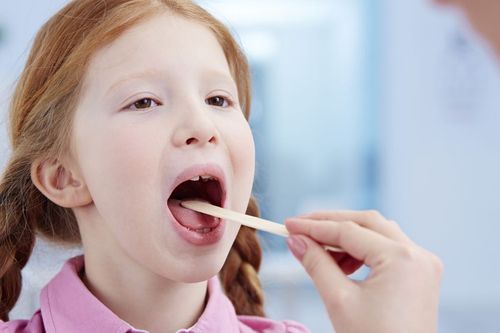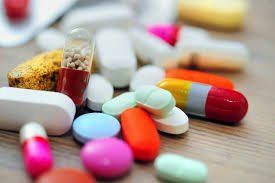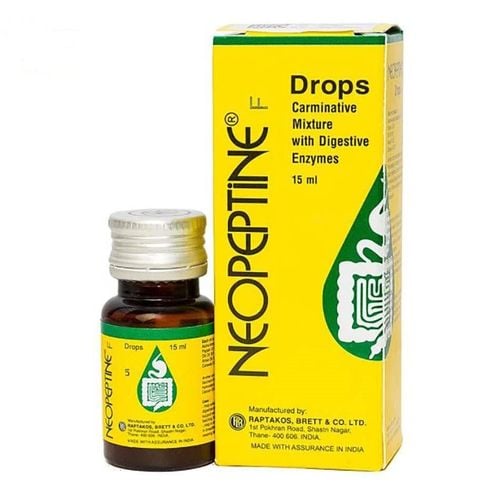Tonsillitis is a common disease in young children, causing pain and difficulties in eating and drinking. This leads to anorexia, anorexia and loss of appetite in children. So what should children with tonsils eat to quickly recover from the disease? Read the following article to help parents with answers.
1. Principles when taking care of children with tonsillitis
The tonsils are 2 lymph nodes located on either side of the throat wall, which are an immune barrier that has the function of preventing infection and protecting the lower respiratory tract. Lymphocytes of the tonsils are highly active in children, especially between the ages of 4 and 10. Tonsillitis is a condition in which the tonsils are attacked by viral or bacterial agents, causing signs of inflammation, redness, and even pus.
Tonsillitis can occur at any age, in which children from 3 to 5 years old are most susceptible. Children with tonsillitis often have long coughs, sore throats, discomfort, pressure on the airways and difficulty eating. Over time, children will lose their appetite, leading to malnutrition, growth retardation and affecting the physical and intellectual development of children.
For children with tonsillitis, the diet as well as choosing the right foods for meals is an important key for children to quickly recover from illness, enhance resistance and ensure nutrition for development. . So what should babies with tonsils eat? First of all, parents need to understand some principles of eating for children with tonsillitis as follows:
- Eat cooked food and drink and always ensure safety and hygiene: Tonsillitis can originate from the invasion of bacteria. or viruses in unsafe food. Therefore, eating cooked, drinking boiling water and always ensuring safety and hygiene is the first rule to follow in the diet for children with tonsillitis.
- Do not eat foods that are too hot or too cold: Foods that are too hot or too cold will irritate the inflamed tonsils and cause more pain around them. Therefore, do not give these foods to children when they have tonsillitis.
- Food should be soft, liquid and easy to swallow: Inflamed tonsils will often compress the throat, causing difficulty breathing and swallowing food for children. Therefore, parents should cook foods that are soft, liquid and easy to swallow such as soups, warm soups, porridge, simmered foods, slippery dishes, etc. to reduce throat rubbing, soothe inflammation and help Baby relieves sore throat while eating. Nutritional porridge combined with mashed vegetables such as potatoes, pumpkin, ... is always the preferred choice. In addition, milk is also an easy food to swallow and provides many essential nutrients for children. Absolutely do not let children eat dry or deep-fried foods because it will make the inflamed tonsils worse.
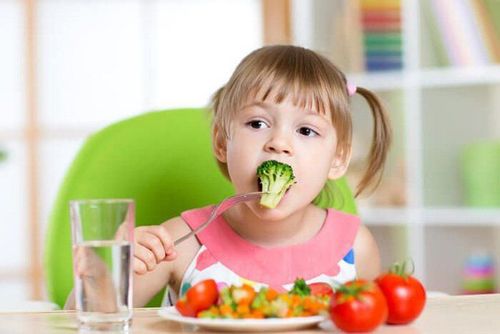
2. What should children with tonsils eat?
What should children with tonsils eat to quickly recover from the disease is the question of many parents whose children have this condition. However, no matter what type of food you choose or how you build a diet, children with tonsillitis must ensure that they are fully and balanced with four important groups of nutrients: protein, carbohydrates, and carbohydrates. fats, vitamins and minerals, to strengthen the immune system and prevent health deterioration.
Here are the foods that should be included in the diet of a baby with tonsillitis:
Zinc-rich foods
To help children improve their resistance against pathogens and quickly recover comprehensive health Children with tonsillitis should supplement with trace minerals such as potassium, iron, zinc, ... In which, zinc is a trace element that is essential for the development of children and helps strengthen the immune system. fight disease. Zinc also promotes T-lymphocytes to destroy harmful agents. Therefore, zinc is essential to prevent upper respiratory tract infections such as colds, sore throats, and tonsillitis. Parents should supplement their children with zinc-rich foods such as oysters, beef, liver, squash, seaweed, ... to shorten the time of illness and protect health.
In addition, the iron found in foods such as wood ear soup, honey green tea, lean meat cooked with dandelion, ... can support quick recovery of tonsillitis in children.
Supplement with vitamin C
The best way for children with tonsillitis to quickly recover from the disease is to strengthen and strengthen the child's immunity. In particular, vitamin C is one of the nutrients that support the function of lymphocytes, helping the immune system work better by stimulating the production of interferon - a protein that plays an infection-fighting role. Moreover, vitamin C also improves the respiratory system as well as overall health, destroying free radicals that are harmful to health. Many studies show that consuming about 1000mg of vitamin C a day can help reduce about 50% of symptoms of nasopharyngeal diseases as well as respiratory infections.
Therefore, in the diet for children with tonsillitis, it is recommended to add a lot of vitamin C. The foods that contain a lot of vitamin C are mainly fruits such as grapefruit, oranges, tangerines, strawberries, passion fruit, bars. dragon fruit, pomegranate, acerola, guava, blueberry... If children have difficulty in chewing and swallowing fruit pieces, parents can squeeze the fruit into water for the child to drink. This will relieve symptoms and soothe a burning throat.
Do not give lemon and mango juice to children with tonsillitis because it contains a lot of acid that causes sore throat. For orange and grapefruit juice, it should be diluted and given to the child to drink little by little to avoid affecting the throat.
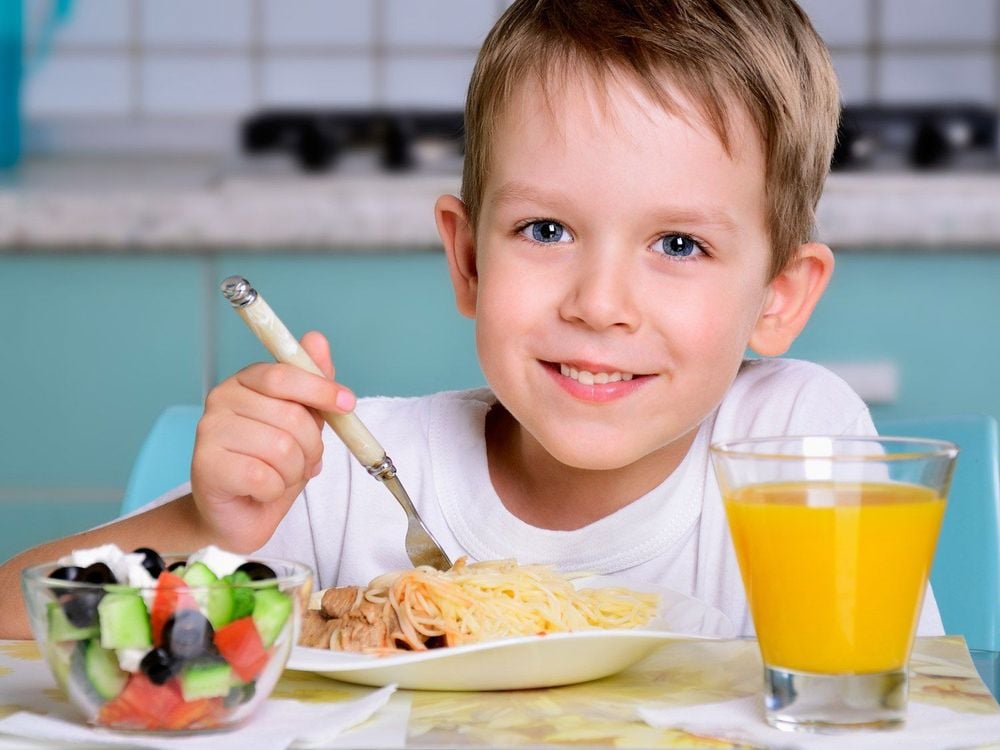
Nutrient-rich dishes
Protein is one of the four essential nutrients. Although it does not affect tonsillitis like zinc or vitamin C, protein helps to improve health, provide an abundant source of energy, improve muscles and increase resistance to harmful agents. In fact, children with a moderate diet and supplementing with the necessary amount of protein often have a shorter treatment time and less complications than children with a poor diet.
Protein-rich foods include chicken, pork, beef, fish, eggs, milk, etc. However, children with tonsillitis should only eat foods rich in soft and easy-to-digest proteins such as shredded chicken, minced meat. , eggs, milk, salmon,... Do not let your baby eat bacon, grilled meat and canned food.
Milk and dairy products
Milk is a drink with abundant nutrients, such as fat, protein and good bacteria for the digestive system and immune system of children. Drinking warm milk will help soothe the sore throat caused by tonsillitis, especially when the child has difficulty eating.
In addition, dairy products such as cheese, yogurt, whey... are also ideal options to supplement nutrients for babies with tonsillitis.
Therefore, if parents are wondering what children with tonsillitis should eat, milk and dairy products are a food group that cannot be ignored.
Green vegetables
The answer to the question "what should children with tonsils eat" is green vegetables. When the baby has tonsillitis leading to poor eating, the baby anorexia causes a large deficiency of fiber, vitamins and minerals in the body. Therefore, parents need to add green vegetables and fruits to their baby's diet to improve their resistance.
Green vegetables rich in vitamins and minerals necessary for the immune system include: broccoli, spinach, cauliflower, tomatoes, spinach, lotus root, ... Combine green vegetables in soups and soups both create delicious taste, eye-catching colors and make it easier for children to eat.
In addition, green vegetables and fruits also have cool properties to help cool down, reduce fever, reduce swelling and inflammation very well, dilute phlegm, help soothe swollen tonsils and throat, restore mucosal area. injured. Vegetables that contain a lot of water such as spinach, cabbage, cabbage, cucumber, jute, ... help rehydrate, balance electrolytes and reduce fatigue.
Filtered water
Tonsillitis causes body temperature to rise, dry mouth, hot swollen throat and dehydration. When parents are wondering what children with tonsils should eat and drink because the child is very anorexic, just let the child drink more water to detoxify the body, reduce the swelling of the tonsils, leading to dryness. and sharp pain, dilute the phlegm and replace the lost water in the body.
Children often cannot drink large amounts of filtered water at once, so parents should divide it into several times a day to make it easier for children to drink. It is best to give the child warm or cold water to drink because cold or hot water will damage the oral mucosa more.
In addition to filtered water, parents can give their children other drinks such as fruit and vegetable juices, coconut water, ... to both rehydrate and supplement vitamins and minerals for a healthy immune system.
Spices with antibacterial and anti-inflammatory properties
Bacteria and viruses that cause tonsillitis can spread to the nasopharynx, larynx, and sinuses. In addition to the reasonable use of antibiotics, parents can use some benign spices with antibacterial and anti-inflammatory effects to support the treatment of tonsillitis for children such as honey, Turmeric, ginger, radish, cloves, radish,... With natural active ingredients, these spices are not only harmless to health but also support the immune system to function properly. than. Parents can combine ginger, turmeric, ... to process with dishes. Honey can be mixed with turmeric for children to drink (note that honey is only for children over 1 year old).
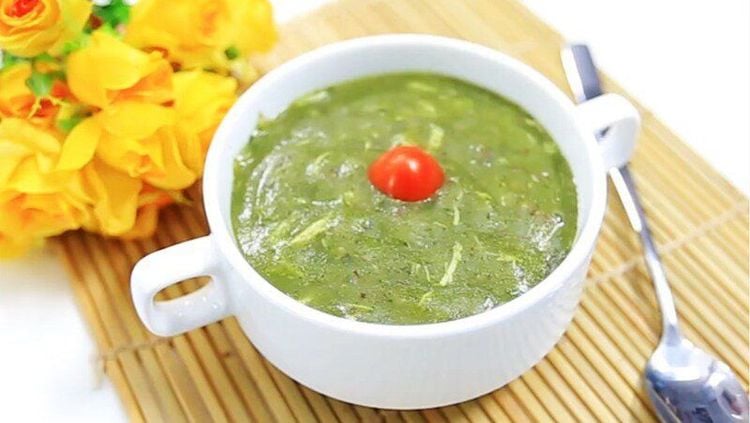
3. What should children with tonsillitis eat?
In addition to the problem of what children with tonsillitis should eat, parents also need to pay attention to taboo foods for children. Foods that children with tonsillitis should not eat include:
Hard foods
Inflamed tonsils make it difficult for children to chew and swallow. Therefore, dry, hard foods such as cereals, breads, cookies, dried vegetables, baked goods, popcorn, nuts (almonds, chestnuts, sunflower seeds, peanuts, ...) Although it gives children a lot of energy, it makes the lining of their throat and tonsils more swollen and painful. Moreover, these dishes can be stuck in the tonsils, making inflammation and damage worse, creating conditions for bacteria to attack the tonsils. Instead, parents can process them into easier-to-eat foods, suitable for their baby's current situation such as: cereal flour, cereal porridge, cashew milk, almond milk,...
Sour food and spicy
According to traditional medicine, spicy food causes toxic accumulation in the body and tonsillitis is more serious. Foods with a sour and spicy taste, especially with high acidity such as vinegar, lemon, octopus, toadstool, tamarind,... will strongly stimulate the lining of the throat and tonsils, causing more discomfort, swelling, and inflammation. At the same time, the acid also causes the pharynx and tonsils to corrode, leading to severe sore throat, dry cough and hoarseness, loss of voice.
Fried, greasy foods
Fat in fried foods will cause the immune system to decline, and the recovery time for inflammatory symptoms will take longer. Therefore, parents should limit their children with tonsillitis from eating fried, fatty foods.
Cold foods and drinks
Cold foods and drinks such as ice cream, cold soft drinks, and ice will make sore throat and swollen tonsils worse. Therefore, parents should not let children eat and drink these foods while the tonsillitis is still progressing.
Carbonated Drinks
Carbonated drinks contain a large amount of gas and sugar along with many chemicals that are not good for health. Carbonated drinks will make the child's tonsillitis worse and also more difficult to recover. Foods and drinks high in sugar are also not good for the throat and immune system, causing the tonsils to swell and cause more discomfort. Therefore, instead of giving children carbonated soft drinks, parents should replace them with fruit juice, filtered water or honey water.
4. Some ways to make your child's throat more comfortable
In addition to caring about what children with tonsils should eat and drink, parents also need to know supportive measures at home to reduce inflammation and swelling, make the child's throat comfortable, and eat easier. Support measures include:
- Keeping the living environment clean, away from dust and polluting hazardous waste; Wear a mask when going out or in public places to avoid inhaling airborne dust.
- Regularly clean the nose, throat and teeth by brushing and rinsing with warm salt water or physiological saline.
- Limit early talk and talk too much; Take throat lozenges to reduce inflammation.
- Use a humidifier to keep the mucous membranes in the throat moist.
- Always keep the body warm, paying special attention to the nose and neck area.
- Eat enough nutrients, especially foods rich in vitamins and minerals.
- Take a pain reliever such as paracetamol (but do not give aspirin to children because it can cause Reye's syndrome).
- Let children exercise and expose to early morning sunlight every day to improve their physical strength and strengthen the body's immunity.
- Children should be taken to the hospital as soon as there are abnormal signs such as high fever, shortness of breath, cyanosis, ... to avoid serious disease progression and complications.
In summary, tonsillitis is a common disease in young children, causing pain and difficulties in eating and drinking. This leads to anorexia, anorexia and loss of appetite in children. In order to prevent common diseases in children such as respiratory infections, diarrhea, constipation, etc., parents need to follow a nutritious diet suitable for children and add necessary micronutrients such as zinc, Selenium, Chromium, Vitamins B1 and B6, Ginger, acerola fruit extract (vitamin C),... to improve taste, eat well, reach the correct height and weight, strengthen resistance to reduce minor illnesses and less likely to have digestive problems.




